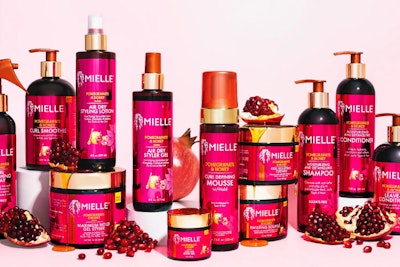Mielle Organics
Rooted in serving the needs of the textured hair consumer

Mielle Organics' Sustainability Rating
Insufficient
Ingredients
Mielle Organics has made some ingredient commitments to lower its environmental impact, including by avoiding parabens and select other petrochemical-based ingredients. Its parent company, P&G, makes commitments across all owned brands to avoid phthalates, microplastics, select petrochemical-based ingredients, and uncertified palm oil. While it has made commitments, Mielle Organics appears to still use some petrochemical-based ingredients that pose a significant threat to the climate. It doesn't report having any product or company-level certifications, though it has one product line accredited by the Skin Health Alliance.
Containers & Packaging
Mielle Organics doesn't discuss its packaging at the brand-level. It appears to use primarily plastic packaging. Its parent company, P&G, has made efforts to minimize the volume of its packaging overall, but it's unclear which initiatives extend to this brand. P&G aims to achieve 100% recyclable or reusable primary packaging by 2030 and is on track. It has been trying to decrease its use of virgin plastic since 2017 but is making slow progress.
Energy & Water Use
Mielle Organic's parent company, P&G, shares information on its overall energy strategy but doesn't provide details at the brand-level. It uses a majority of renewable energy to power its production sites and corporate offices, and is targeting 100% renewable energy by 2030, for which it's on track. It implements energy efficiency measures in its production sites, but doesn't provide many specifics or detail if this extends to its corporate offices. It has water conservation initiatives in its production focused on water restoration and water positivity. Mielle Organics has a global production span, which is standard for the industry.
Refill & Reuse
Mielle Organics doesn't utilize any alternative models or methods to avert waste. It offers bulk sizes for some products, which may help reduce packaging waste.
Slow Cleaning
Mielle Organics offers seasonal products or frequent releases, which can encourage overconsumption and production of excess inventory.
Marketing
Commons is still evaluating this brand's marketing emails.
Transparency & Reporting
Mielle Organics doesn't appear to have a sustainability page or centralized source of relevant information. It also doesn't provide customers with any link to its more comprehensive parent company site. Its parent company, P&G, publishes a detailed annual report with a clear, impact-driven strategy and progress reporting, though its baseline numbers could be clearer. Its last annual report was published in 2023. Mielle Organics shares a complete list of ingredients used in its products, on a per product basis.
Emissions Tracking
Mielle Organic's parent company, P&G, internally measures and publicly reports its company-level emissions in partnership with, or with auditing from, a third party. It includes a breakdown by scope and identifies its top driver of emissions. The last reporting period was 2023. In this most recent update, P&G's estimated emissions footprint was 192,739,586 tons CO2e.
Targets & Offsets
Mielle Organic's parent company, P&G, has SBTi-approved emissions reduction targets for the medium-term (5-10 years). It has reported on its progress within the past year, and is on track for its scope 1 + 2 targets but not its scope 3 target. Its net zero commitment was recently removed by SBTi for not meeting the deadline to provide science-based targets. Commons couldn't find evidence that this brand offsets any emissions.
Supply Chain & Labor
Mielle Organic's parent company, P&G, doesn't publish information about its supply chain partners. It publicly shares a supplier code of conduct, which prohibits forced labor, prohibits child labor, and includes environmental clauses. Its code of conduct doesn't disallow unauthorized subcontracting, ensure the right to collective bargaining where not allowed by law, ensure a living wage, or establish grievance mechanisms. P&G has a stated policy of regularly auditing its supply chain partners, which can mitigate human and environmental risks.
Advocacy
Mielle Organic's parent company, P&G, discloses all of its trade association memberships, including those that are climate-obstructive. P&G is a member of 4 large climate-obstructive trade associations: U.S. Chamber of Commerce, Business Roundtable, Personal Care Products Council, American Chemistry Council. It isn't a member of advocacy organizations advancing climate policy. P&G employs state lobbyists with few fossil fuel aligned clients. P&G donated $500k-1M to climate-obstructive candidates or PACs from 2018-2024. Of this amount, 12.99% more was given to obstructive candidates or PACs than to pro-climate ones.
Mielle Organics has a Insufficient rating due to an overall lack of sustainability initiatives at the brand-level. Its parent company has made some overall progress, but we expect more reporting and transparency from a company of its size.
While Mielle Organics makes brand-level ingredient commitments and successfully avoids parabens and phthalates, it still uses some other petrochemical-based ingredients that pose a significant threat to the climate. It doesn't utilize any alternative models or packaging minimization strategies to reduce its waste and emissions footprint. Mielle Organics doesn't disclose anything about its packaging, but it appears to use primarily virgin plastic packaging, which contributes greatly to further waste production and excess energy use. Its parent company reports on its renewable energy use and emissions measurement, and it has SBTi-approved emissions reduction targets which are partially on track.
Mielle Organics is owned by Procter & Gamble (P&G). P&G is holding back government climate action through its money and influence.
Our ratings are based on a scale from 1 (bad) to 5 (best). How we rate →
https://us.pg.com/ingredients/
https://downloads.ctfassets.net/oggad6svuzkv/7PrU3Jq8gGsPAUl7fgZiR/919bd0309ccc76fd6365e047ba58ee5a/P_G_2023_Citizenship_Report_PDF.pdf
https://mielleorganics.com/pages/product-safety
https://us.pg.com/environmental-sustainability/
https://us.pg.com/blogs/closer-look-global-water-strategy/ https://s1.q4cdn.com/695946674/files/doc_downloads/esg/2022/water/P-G-Strategy-Toward-a-Water-Positive-Future.pdf https://www.pginvestor.com/esg/environmental/water/default.aspx
https://www.pginvestor.com/esg/environmental/climate/default.aspx
https://s1.q4cdn.com/695946674/files/doc_downloads/esg/2023/Climate/pg-fy-22-23-assurance-statement.pdf
https://www.pginvestor.com/esg/environmental/climate/default.aspx#climate-scope-1-2
https://us.pg.com/blogs/net-zero-by-2040/
https://trellis.net/article/microsoft-pg-unilever-and-walmart-among-239-companies-miss-net-zero-deadline/
https://pgsupplier.com/assets/content/Documents/Supplier%20Sustainability/P&G%20Responsible%20Sourcing%20Static%20Document.pdf?v=20240619
https://us.pg.com/structure-and-governance/our-political-involvement/
https://fminus.org/lobbyists/
https://www.fec.gov/data/browse-data/
Get Rewards
Earn for sustainable purchases
Commons rewards you for sustainable purchases from all our Top Rated brands, plus thousands of everyday purchases — from thrift stores to public transit.
Learn more about rewards ->







